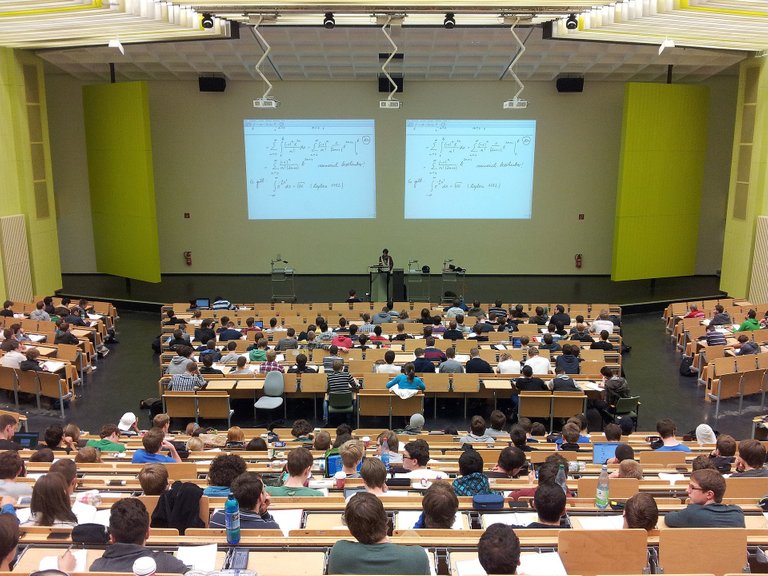Technology's Impact on Education
The use of scientific knowledge for practical applications is referred to as technology. The importance that technology plays in human existence has grown since the beginning of the industrial revolution, and there are many things that we have and can do now that our fathers and grandfathers never thought were feasible.
Technology is becoming a part of daily life for people thanks to technological advancements. Technology has an impact on every element of our lives, and education is one of those areas.
Before, all of our knowledge came from hard-copy books, making finding information a tedious process that required juggling many volumes. However, with the introduction of personal computers, the internet, and search engines. We now learn and conduct information searches quite differently.
 Source
Source
Technology like computers, smartphones, and other devices was unavailable to me and the majority of children in my nation while I was in primary school. Actually, only schools in the top tier had computer laboratories, and smartphones weren't even out yet or were still in their infancy.

The surge in smartphone use was already the norm while I was in senior secondary school. In my nation, the internet was already established, and nearly all children are familiar with the term "google." But unlike now, smartphones and even personal computers weren't widely used or accessible to most secondary pupils. I frequented cybercafes whenever I needed to do an assignment that required access to the internet.
I was able to browse several offline encyclopedias like Encarta and Britannica thanks to my access to a personal computer. Because of this, I learned a lot of facts and general knowledge that weren't taught in school.

I was able to learn and read stuff online during my last days of high school since I had access to an internet phone. Wikipedia and other free literary sites were also accessible to me without charge. However, I started using the internet heavily when I started applying to universities and when I was an undergraduate.
 Source
Source
The internet, and particularly YouTube, was tremendously useful in my university 100-level course. I was able to have access to videos that provide a far clearer explanation of what was taught in class than the lecturer could ever. When you aren't at the front of the class, it can often become so crowded that you can't hear what the teacher is saying. Thankfully, YouTube saved the day.
I have been increasingly dependent on the internet to ace my courses ever since my first year of college. Since my first year, the majority of my textbooks have been digital and are accessible on my phone or computer. Hence, I'm spared from carrying dozens of books up and down.
Lockdown
Technology's importance in education became more significant than ever during the COVID-19 lockdown in 2020 and 2021. Many institutions learned that hosting virtual classes could be just as successful as traditional ones. In my institution, practically everyone took their exams online, which allowed us to save money that would have been spent printing papers and setting up testing facilities.
 Source
Source
Technology has made school less stressful and has transformed it for the better. In fact, you may enroll in any institution in the world from the convenience of your home.
Drawbacks
But it's important to not overlook the drawbacks that technology also has.Compared to individuals who attended school when technology was scarce or nonexistent, pupils nowadays are seen to be lazy.
As a former teacher, I saw firsthand how using a calculator causes kids' mathematical aptitude to drop. Technology does make studying more comfortable, but it also introduces distractions and other detrimental elements. One of the key disadvantages of the widespread use of technology for learning is distractions.
Additionally, especially when it comes to written material, technology has made kids less imaginative than in the past. They have no trouble plagiarizing and copying material from many sources. In reality, as the capabilities of artificial intelligence increase, more pupils will become sluggish than ever.
Conclusion
Finally, I can confidently state that technology has improved education more than it has harmed it. The use of technology has improved education and will likely continue to do so, but rather than ignoring its negative effects, we should all work to lessen them by pushing our kids' creativity while educating them to bring out the best in them.

Everything has a disadvantages and advantages but I think the advantages of technology in education is higher. COVID has brought about the online classes and it helped boost online education. So far , technology has really had a positive effect on education
Indeed the advantages of technology on education is higher than it disadvantages but that doesn't mean we should overlook its disadvantages.
Thanks for stopping by @cescajove
Certainly, I would never overlook it because without it I can't balance both to effective use.
It's my pleasure Tomi!
You're welcome
I love the drawback you have mentioned and I totally agree with you but them I think this is were so many parents have failed because they should be able to know of their children are dependent totally on their computers or not. And for those who are not fortunate to have people to guide them, I'm sure most of them won't be found wanting because life will teach them, hehe.
This was an interesting read, thank you so much for Sharing your experience and thoughts on this.
Thanks for finding my article interesting and worth reading. Pardon my late reply.
You're welcome Tommy, it's my pleasure and you don't have to apologize, it happens.
Omo...
I remember the first day I discovered Wikipedia. It was like I discovered a treasure. It was my go to for in depth research that year. It really came through for me.
Thank you for sharing this with us.
Same here too. Discovering Wikipedia was an eye-opener and I got a lot of information from it.
Thanks for the comment, sir.
Congratulations @tomiajax! You have completed the following achievement on the Hive blockchain And have been rewarded with New badge(s)
Your next target is to reach 600 comments.
You can view your badges on your board and compare yourself to others in the Ranking
If you no longer want to receive notifications, reply to this comment with the word
STOPCheck out our last posts:
Support the HiveBuzz project. Vote for our proposal!